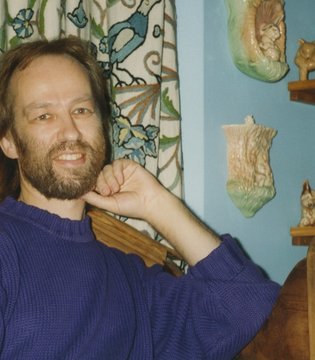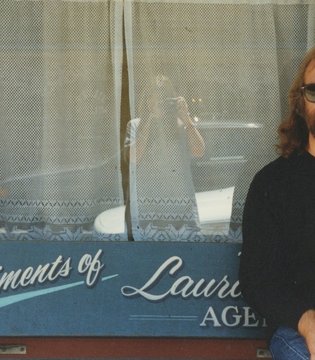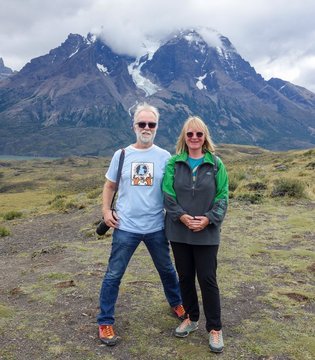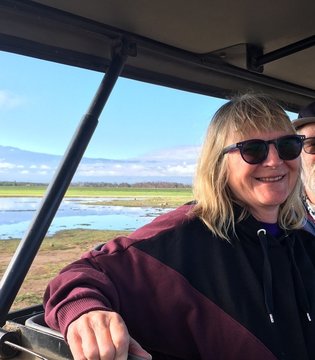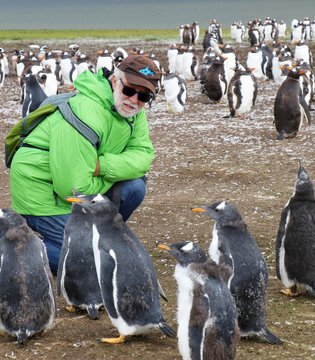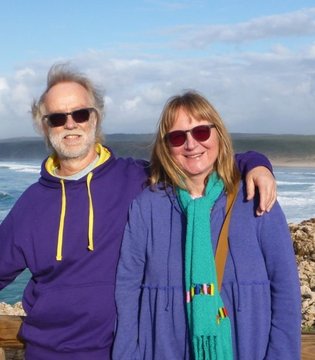"I always had an excuse for things. I wish I had been more realistic."
Rik: “When I was 36, I was diagnosed with IgA nephropathy (IgAN). At the beginning, the disease didn’t wasn’t too bad, and I was told I might need dialysis in 20 years’ time. But a few years in, I started getting really bad headaches, vomiting, going to bed for 36 hours straight.
Sally: “I was really worried about the future. We were only in our thirties and kidney disease completely changed our plans. We wanted to take a year out in a camper van and travel, but Rik was having regular check-ups and wasn’t well. One Christmas he got really sick. We were meant to be going away, but we didn’t see anyone. We didn’t even have any food in the house.”
Rik: “I was getting worse, and I was then told that I might only have a year until I would have to go on dialysis. I asked if I could go on holiday, and they said yes, as long as when I got back, I went in for my regular check-up immediately.
“So, my wife Sally and I went to India for three weeks. Sally went through the mill; it was tough for her. Some days she was carrying both of our bags because I wasn’t up to it. I was in denial, really. I didn’t want dialysis to happen. My attitude was: ‘Well, they said it would be another year until dialysis, so I just need to soldier on.’ I always had an excuse for things. I wish I had been more realistic.
“Then we got back from holiday, I went in for my check-up, and I got put on emergency haemodialysis for about three weeks. It was just before Christmas.”
Sally: “We weren’t given as much information as people get now. I’d never been to appointments with Rik and perhaps if I had gone the outcome might have been different. It was frustrating because I could see how sick he was. I’d tell him to tell the doctors and of course he didn’t, but I didn’t want to be a domineering partner. But I did go with him when he got put on emergency dialysis after India.”
Rik: “I think I should have been more honest with myself, at the time. And honest with the doctors. I was almost making light of the whole thing, trying to make them believe it wasn’t as bad as it was. After my emergency haemodialysis ended, I was put on peritoneal dialysis (PD). I got the tubes in just before Christmas and did PD for a couple of months. In the end, I had just under two months on PD because the following February, I had a transplant.”
Rik in 1992, before his transplant and in 1994, after his transplant
"I’m like the queen: I have two birthdays, a real birthday and a kidney birthday."
Sally: “When we got the transplant call, I thought it was an emergency. I answered the phone–”
Rik: “Did you?”
Sally: “Yes! It was three o’clock on a Sunday morning and I remember running downstairs and answering. They asked for Rik, so I put him on the phone. They said to him: ‘Can you come in now?’ We looked at each other and said: ‘Can we?’ We weren’t expecting it at all, we had no bags packed, nothing. It was about a 10 minute drive to the hospital, and I remember, on the way there, Rik said: ‘I’m not sure I want this.’”
Rik: “It was only a brief thought, running through the options in my head. At the time, I was doing PD at work, and I felt like I was getting my life slightly back together. I was feeling well.”
Sally: “We never expected to get the call and we were settling back down into the routine of PD. It was the unknown, we hadn’t been told much about kidney transplants. Still, I replied to Rik and said: ‘You bloody well are having the transplant.’”
Rik: “It is normal have those kind of thoughts, even if it is just for a moment. I had dismissed it by the time I got to hospital.”
Sally: “We had no idea what to expect with the operation.”
Rik: “Thinking back, we weren’t given much information when we went first went on the transplant list. We chatted for less than an hour to the Transplant Sister. That’s just how it was then. The transplant team were fantastic, but there just wasn’t much information.”
Sally: “It was frightening when Rik got wheeled out after the transplant. I was only 40, and I wasn’t prepared to see my husband is lying there with tubes here and bags there.”
Rik: “I remember I was incredibly thirsty after the operation. Sally was using swabs to give me liquid, they have water on them that you can suck. It was such a wonderful relief.”
Sally: “He was in pain, and I got really upset. Rik doesn’t remember that at all. His parents rang and the nurse gave me the phone. I was watching him crying out in pain and I had to tell his mother that he was fine. I was sitting there for a few hours upset, but it’s natural. I went back into the hospital the next day and he was fine, happy as anything.”
Rik: “The day after that I was bad again, it was very much a blur. I had a good day, and then a bad day, and then I was okay again.”
Sally: “He came out faster than expected, after five days. The whole team was brilliant. We always remember it because the transplant was on Valentines and it’s Rik’s birthday a few days before, so it is a combination of celebrations. On his birthday he was doing PD and just over a week later he’d had a kidney transplant. No wonder it takes getting used to. It was life-changing.”
Rik: “I’m like the queen: I have two birthdays, a real birthday and a kidney birthday.”
"I like to think we’ve taken the opportunity that the wonderful donation gave us"
Rik: “There were ups and downs for some while after the transplant, a few episodes of rejection. There were lots of side effects, too. I remember I had incredibly shaky hands and I was so self conscious about it. That was, until I realised that I wasn’t alone. I was going to the clinic every other day, and after my check-up, me and few others would go to a coffee shop to wait for transport. One day I noticed that all of their hands were shaking too. It was such a funny sight, the four of us trying to drink coffee and getting it everywhere. But it was so reassuring.
“Shared experiences in those early days after the transplant is very important. You have this whole ‘history of transplantation’ sitting there in the waiting room with you. Some people are new, some are in there for a three-month check-up, some are a year down the line from their transplant. You gain information from your peers that is incredibly useful.
“The fact you’re seeing the same people – staff and patients – each time is great. The staff were relaxed and jokey, I got to know them all really well. The consultant was brilliant and calm and gave me all the time I needed. If drugs needed changing, it was a conversation between us. I always felt very included.
“Sally and I said straight away that we’d been given a brilliant chance with the transplant, and we wanted to live our lives to the fullest. I’d just turned 40 when I had my transplant and I said: ‘If I get to 60 that’ll be brilliant’. In the end, we’ve surpassed that. I like to think we’ve taken the opportunity that the wonderful donation gave us.”
Sally: “Our first trip was to the Lake District and Rik forgot to pack all his drugs – you’d think that’d be impossible to do! Then our first trip abroad was to Grenada, about a year after the transplant. We chose Grenada because there was a local dialysis unit. In the early days after the transplant, we didn’t really understand what could go wrong, what was and wasn’t risky.”
Rik: “It can feel as though you’re faced with a choice, how much do you want to live your life vs how much do you not want to lose your kidney? That to-and-fro has been going on for the last thirty years. It’s about calculated risks.”
Sally: “The transplant comes into nearly every decision we make in our lives, one way or another.”
Rik: “It is an ongoing commitment and part of your life. I don’t think about it every day, I don’t dwell on it, but it has changed my life.”
Sally: “The thing I’d tell people is do not be frightened to ask questions. Ask as many as possible! Doctors don’t think you’re silly, ask the dumbest questions you can. During the pandemic, we had a lot of trouble accessing the Covid-19 vaccinations that Rik was entitled to, and the Kidney Care UK Facebook group was brilliant. We got so much advice from all over the country. It’s just really good to have other people to talk to, we help others, and they help us.
“Beyond that, simply seize the day. Just try to enjoy the present. Rik got to his 70th birthday with a 30-year-old kidney, anything can happen.”
Rik: “I hope my transplant story can give people hope. I am proof that 30 years with a kidney transplant is a real possibility.”
